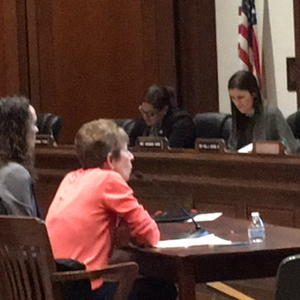
Steinberg testifies in December.
Cindy Steinberg, U.S. Pain’s national director of policy and advocacy, testified twice at the Massachusetts State House in recent weeks on important pain policy legislation. On Dec. 19, she testified in support of a bill to ensure pain is properly assessed and managed in all health care settings. On Jan. 16, she expressed concern over some aspects of a bill that may go too far in restricting pain medications.
“An Act Requiring Pain Assessment and Management in Healthcare Facilities” (House Bill 1181 and Senate Bill 1183)
Steinberg organized and led two panels on Dec. 19 – one of pain patients and another of pain management providers who testified at the hearing in support of this legislation. The bill was authored as a collaboration between U.S. Pain Foundation and the Massachusetts Pain Initiative. It is being sponsored by Rep. Jay Kaufman and Sen. Julian Cyr.
“The Joint Commission, which accredits health care institutions, does include this right, but it does not cover all health care facilities, like long-term care facilities and surgical centers,” says Steinberg. “We believe pain assessment and management in any health care setting should be a basic right for everyone.”
Steinberg encourages Massachusetts residents to reach out to the chairs of the Joint Committee on Public Health, Rep. Kate Hogan and Sen. Jason Lewis, as well as committee members, and ask them to report the bill favorably out of committee by Feb. 7.
“An Act Relative to Combating Addiction, Accessing Treatment, Reducing Prescriptions, and Enhancing Prevention” (House Bill 4033)
On Jan. 16, Steinberg also organized and led two panels of patients living with pain and health care providers to testify on this bill, which was filed by Gov. Charlie Baker. Known as the CARES Act, the legislation outlines a $110 million plan for addressing the opioid epidemic. It includes a number of provisions, such as:
- Creating a new process for involuntarily hospitalizing individuals with substance use disorder who are at risk of hurting themselves,
- Implementing new standards for credentialing addiction treatment facilities,
- Requiring electronic prescribing for all controlled substances,
- Seeks new limits on prescribing and increased penalties on doctors who are seen as “overprescribing,”
- Allowing patient-requested partial fills on category II scripts, with the ability to obtain the remainder, if needed, from the same pharmacy,
- Establishing more comprehensive school-based prevention education programs
“We are in support of many of these measures, which aim to increase and improve the support available to those with substance use disorder and to prevent abuse and overdose from happening in the first place,” says Steinberg. “But we are concerned that adding new penalties for doctors who prescribe opioid medications may worsen the chilling effect these measures have clearly had on pain care. We hear almost daily from people with pain who have been cut off from pain relief or dropped from care completely.”
If you are a Massachusetts resident who has encountered barriers to accessing medication that has helped you, call the chairs of the Joint Committee on Mental Health, Substance Use, and Recovery and tell them your story. Urge them to remove the punitive language aimed at doctors that is causing them to turn patients with chronic pain away. Ask them to support measures that would require insurers to cover alternative therapies for pain.
